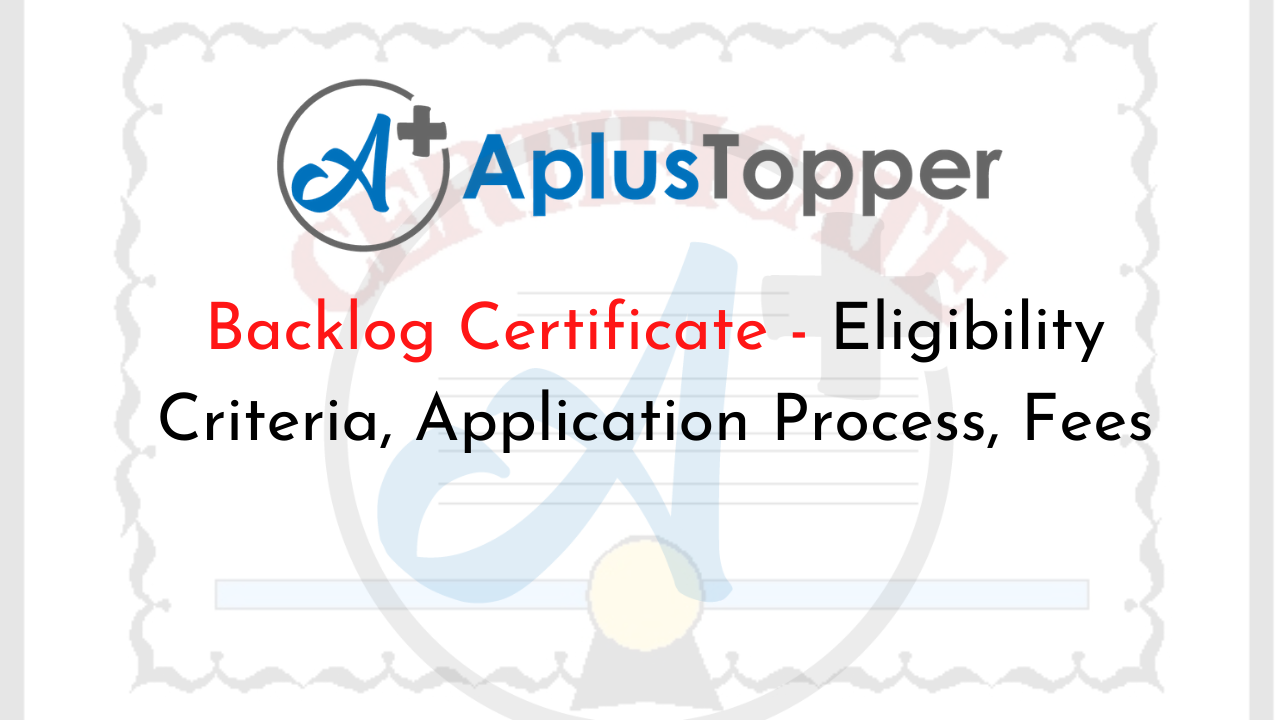Backlog Certificate: If you wish to study abroad, most international universities often require you to produce a backlog certificate. In India, this concept is not as common and many applicants may get confused as to what it exactly is and the purpose it serves. In this article, we shall explore the meaning of a backlog certificate, its uses, eligibility criteria and the procurement process.
Students can find more about certificates, explore the types used for academic purposes, professional purposes and more.
What is a Backlog Certificate?
Sometimes, when a student is unable to clear a prescribed university course, it becomes a backlog. In such cases, a backlog certificate is sought from the university. This essentially indicates the student’s academic performance.
Students can find more about certificates, explore the types used for academic purposes, professional purposes and more.
Why do I Need a Backlog Certificate?
Most universities and colleges have certain eligibility criteria that need to be fulfilled by the applicants if they wish to seek admission. A backlog certificate is one such eligibility criteria that most universities seek from new applicants. However, do note that no university accepts applicants with existing backlogs. Alternatively, there are universities that offer admission to students on the basis of scores secured in standardized exams such as GMAT, GRE, TOEFL, ACT etc. In these situations, standardized exams are seen as an alternative to academic records. In this article, we shall explore the implications of a backlog certificate, colleges that accept backlogs and more.
How Do I Procure a Backlog Certificate?
Backlog certificates are usually provided by the educational institutions that you have pursued your course in. Moreover, these same institutions are also tasked with providing you with your academic transcripts or graduation certificates. Also note that, in certain cases, you will have to apply for a backlog certificate even if you do not have a backlog. For procuring that, you will still have to approach your current educational institution and request for a “no backlog certificate.”
Backlog Certificate Implications
Having a backlog might be unavoidable. It might be because of an unforeseen event or just plain bad luck. However, there are colleges that do accept candidates with backlogs. Most allow a backlog of 2 or 3, but regardless, you need a backlog certificate to showcase that your academic records are clear. As a general rule of thumb, universities prefer to select candidates that are academically inclined, if not gifted. Therefore, you may want to clear your backlogs before you apply for admissions to universities. Also do note that many universities can also consider standardized tests (such as GRE, GMAT and TOEFL) rather than the academic records from a college or a school. In other words, if you do have backlogs, performing well in the aforementioned standardized tests can help you secure admission to a university.
Using a Backlog Certificate
As stated previously, a backlog certificate is a prerequisite if you wish to study in universities abroad. Hence, this certificate is often coupled with other important documents such as:
- Academic Transcripts – which are essential for any university
Financial documents – which tells the university that you are financially capable of staying abroad and funding your education - Passport – a crucial document, without which admission will not be granted
- Supporting documents such as an Academic CV, Statement of Purpose (SOP), Letter of Recommendation (LOR), or academic essays.
- Some colleges may also require you to furnish your scores for standardized tests such as GMAT/ GRE/ SAT / TOEFL/ IELTS.
Difference Between an Academic Transcript and a Backlog Certificate
Following are the major differences between an academic transcript and a backlog certificate:
| Academic Transcript | Backlog Certificate |
| A transcript has the score of all the subjects present in a course of study | A backlog certificate has only the scores of the subjects the student had a backlog in |
| The final year marksheet has the scores of all the three/four years of the degree, hence, it is not required to provide a transcript for every semester or year. | The same does not apply to a backlog certificate. In case you have a few in each year or semester, you will have to provide backlog certificates for all. |
What if I have no Backlogs?
There are students that have no backlogs during their courses. In such cases, the students will need to produce a “Zero backlog” certificate to prove that your academic records are clear. However, this type of certificate is only applicable in countries such as New Zealand and Australia. Other countries such as Germany and Canada do not require applicants to furnish these documents when seeking admission.
FAQ’s on Backlog Certificate
Question 1.
What is a Backlog Certificate?
Answer:
A backlog certificate is a formal certificate that provides details about a student’s backlogs in their educational institution. This essentially indicates the student’s academic performance as well as the subjects or courses they had backlogs in.
Question 2.
Why do I need a Backlog Certificate?
Answer:
Most universities set certain eligibility criteria that the applicant needs to fulfill if they wish to seek admission. A backlog certificate is one such eligibility criteria that most universities seek – this is to ensure that the student is academically inclined. However, this might not be the case in all universities, as some are willing to accept students with limited backlogs.
Question 3.
What is the difference between an academic transcript and a backlog certificate?
Answer:
A backlog certificate will only have the scores of the subjects the student had a backlog in. On the other hand, an educational transcript will have the score of all the subjects present in that course of study.
